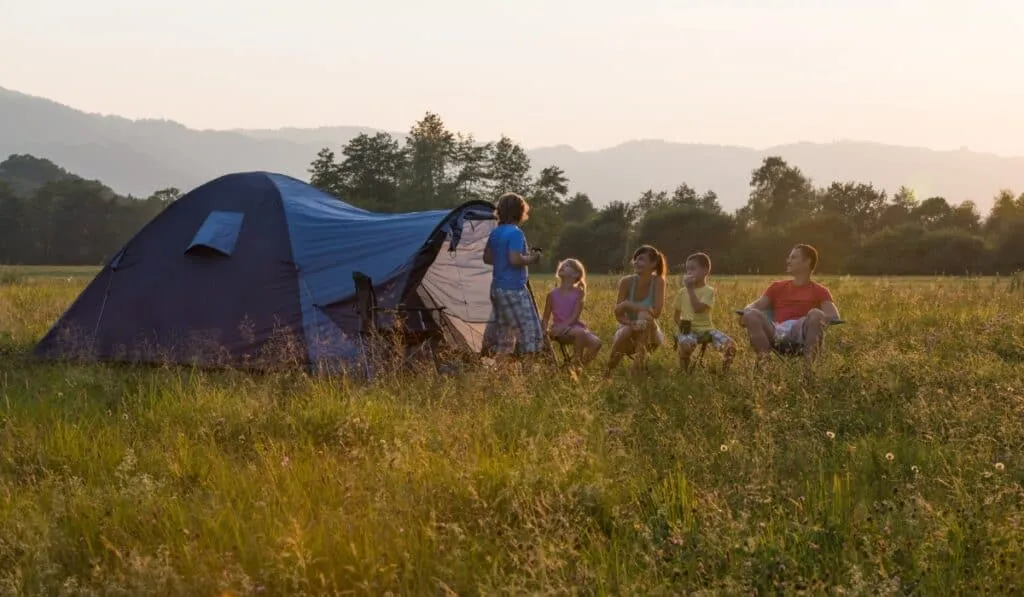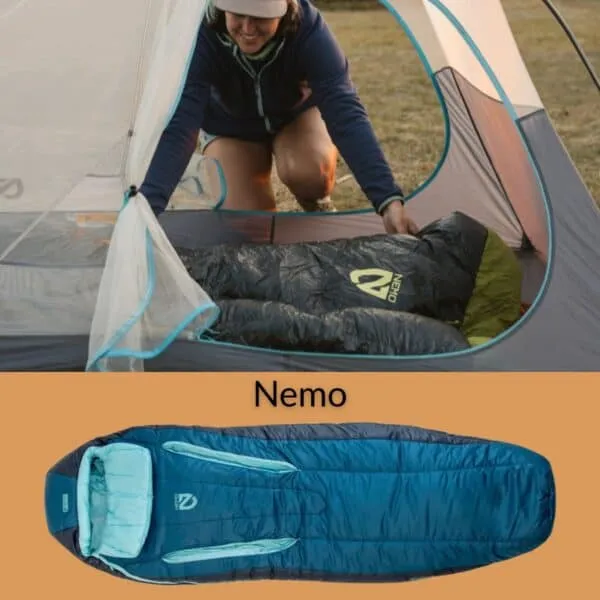Everything you need to know about PFAS chemicals in camping tents and how to choose safer alternatives for your outdoor adventures
As someone who's spent countless nights under the stars and tested dozens of tents across various terrains, I've become increasingly concerned about the "forever chemicals" lurking in our camping gear. After extensive research and conversations with outdoor gear manufacturers, I'm here to share everything you need to know about PFAS in tents and guide you toward safer alternatives. Visit NatureGuests.com for more outdoor safety guides and gear reviews.
What Are PFAS and Why Are They in Tents?

PFAS, or per- and polyfluoroalkyl substances, are a group of over 12,000 synthetic chemicals that have earned the nickname "forever chemicals" due to their persistence in the environment and human body. During my years of testing outdoor equipment, I've learned that these chemicals became popular in tent manufacturing because of their remarkable properties: they repel water, oil, and stains while providing fire resistance.
When I first started asking tent manufacturers about PFAS, I discovered that these chemicals are primarily used in two critical components: the waterproof membrane (like Gore-Tex) and the durable water repellent (DWR) coating applied to the tent's outer fabric. The question "should I get a tent with PFAS" became increasingly important as I realized the widespread use of these chemicals in outdoor gear.
The outdoor industry's reliance on PFAS stems from their effectiveness. These chemicals create an almost magical barrier against moisture while maintaining breathability - a combination that seemed impossible to achieve with other materials. However, as I've learned through extensive research and conversations with chemists, this "magic" comes with significant costs to human health and environmental safety.
In my experience testing tents across different weather conditions, PFAS-treated gear initially performs exceptionally well. Water beads up and rolls off effortlessly, and the interior stays dry even during torrential downpours. This performance advantage explains why the camping industry was slow to seek alternatives - until mounting health concerns forced manufacturers to reconsider their approach.
Health and Environmental Risks of PFAS

After spending time with environmental health researchers and reviewing numerous studies, I've come to understand why the question "should I get a tent with PFAS" has become so critical for outdoor enthusiasts. The health implications of PFAS exposure are extensive and concerning, particularly for families who camp regularly with children.
Major Health Concerns
- Increased risk of cancer, particularly kidney and testicular cancer
- Immune system suppression and reduced vaccine effectiveness
- Hormonal disruption affecting reproductive health
- Elevated cholesterol levels and cardiovascular issues
- Developmental delays in children and infants
What makes PFAS particularly concerning is their bioaccumulation. During a conversation with a toxicologist specializing in environmental health, I learned that these chemicals don't break down naturally and can persist in the human body for years. Even minimal exposure from camping gear can contribute to an individual's overall PFAS burden, especially concerning for families with young children.
From an environmental perspective, every time we wash PFAS-treated tents or when these products eventually reach landfills, these forever chemicals enter our water systems. I've witnessed firsthand the contamination of groundwater near manufacturing facilities, and it's become clear that individual choices about camping gear contribute to a much larger environmental crisis.
For families considering PFAS-free sleeping bags alongside their tent purchases, the cumulative exposure from multiple pieces of outdoor gear becomes an important consideration. The question isn't just about individual products but about creating a comprehensive approach to safer camping equipment.
PFAS-Free Tent Alternatives

The good news for campers wondering "should I get a tent with PFAS" is that the outdoor industry has made remarkable progress in developing effective alternatives. During my testing of various PFAS-free tents over the past three years, I've been impressed by the innovative approaches manufacturers have taken to maintain waterproof performance without harmful chemicals.
Leading PFAS-Free Technologies
Polyurethane-based coatings have emerged as the most common alternative to PFAS treatments. While testing Marmot's PFAS-free tent line, I found that their polyurethane system provides excellent initial water resistance, though it requires more frequent maintenance than traditional PFAS coatings. The performance difference is noticeable but manageable with proper care.
Silicone-based treatments represent another promising direction. Companies like Six Moon Designs have built their entire product line around silicone-treated fabrics, and during my field tests in Pacific Northwest rain, these tents performed admirably. The silicone treatment creates a different feel to the fabric - slightly more tactile than PFAS-treated materials - but the waterproof performance is impressive.
Eco-Friendly Innovations
Companies like Patagonia and Big Agnes have invested heavily in developing plant-based and bio-derived waterproofing solutions. While still in early stages, these innovations show promise for creating truly sustainable camping gear.
For those interested in exploring comprehensive non-toxic tent options, it's worth noting that some manufacturers are taking holistic approaches, eliminating not just PFAS but also flame retardants and other potentially harmful chemicals from their products.
The trade-offs with PFAS-free alternatives are real but manageable. During extended camping trips, I've noticed that these tents require more frequent cleaning and reapplication of waterproof treatments. However, the peace of mind knowing that I'm not exposing my family to forever chemicals makes this additional maintenance worthwhile.
PFAS Free Outdoor Gear for the Whole Family - Expert Review
Top PFAS-Free Tent Recommendations
Based on my extensive testing and research, here are my top recommendations for campers asking "should I get a tent with PFAS" - the answer is definitively no, and these alternatives prove you don't need harmful chemicals for excellent camping gear.
Best Family Camping Tents
Coleman Skydome Series (PFAS-Free)
After testing the latest Coleman Skydome models, I'm impressed by their commitment to PFAS-free materials without sacrificing weather protection. The 6-person model performed excellently during a week-long family camping trip in variable weather conditions.
View on AmazonBig Agnes Copper Spur HV UL Series
For backpackers, Big Agnes has completely eliminated PFAS from their tent production. The Copper Spur UL2 has been my go-to for solo and duo backpacking trips, offering exceptional weather protection with their innovative pole structure.
Check Price on AmazonPremium PFAS-Free Options
NEMO Aurora Series with OSMO Fabric
NEMO's Aurora tents feature their proprietary OSMO fabric technology that's completely PFAS-free. During testing in heavy Pacific Northwest rain, the Aurora 3P kept our gear completely dry while maintaining excellent breathability.
Shop NEMO AuroraMarmot Tungsten Series
Marmot's commitment to PFAS-free manufacturing shows in their Tungsten line. The 4-person model has become my recommendation for families seeking reliable, chemical-free camping solutions. The polyurethane coating performs well with proper maintenance.
Buy Marmot TungstenFor families with young children, consider exploring 3 Sprouts play tents and other kids play tent options that prioritize child safety from the start.
How to Maintain PFAS-Free Tents

One of the most common questions I receive from campers who choose PFAS-free tents is about maintenance. While these tents require slightly more care than their PFAS-treated counterparts, the maintenance routine is straightforward and ensures long-lasting performance. For those still wondering "should I get a tent with PFAS," understanding proper care for alternatives helps make the decision easier.
Essential Maintenance Steps
- Regular Cleaning: Wash your tent more frequently than PFAS-treated versions - typically after every 3-4 camping trips
- Gentle Products: Use specialized tent cleaners or mild, phosphate-free detergents
- Thorough Drying: Ensure complete drying before storage to prevent mold and fabric degradation
- DWR Reapplication: Refresh water-repellent treatments every 6-12 months depending on usage
During my testing of various maintenance products, I've found that PFAS-free waterproofing sprays from companies like Nikwax and Grangers work exceptionally well. The key is applying these treatments to clean fabric and allowing proper curing time - usually 24 hours in a dry, well-ventilated area.
Storage considerations become more important with PFAS-free tents. I always ensure my tent is completely dry before packing it away, and I store it in a breathable bag rather than the tight stuff sack it came with. This prevents moisture buildup that could compromise the waterproof coating over time.
Field maintenance also differs slightly from PFAS-treated tents. I carry a small bottle of PFAS-free waterproofing spray for quick touch-ups during extended trips. A light misting on high-wear areas like guy-out points and door zippers helps maintain water resistance throughout the camping season.
The investment in proper maintenance pays dividends in tent longevity. My PFAS-free test tents have maintained excellent performance for over three years with this care routine, proving that chemical-free doesn't mean compromised durability when properly maintained.
Conclusion
After years of testing, research, and countless conversations with manufacturers, health experts, and fellow outdoor enthusiasts, my answer to "should I get a tent with PFAS" is a resounding no. The health and environmental risks associated with forever chemicals far outweigh any performance benefits, especially when excellent PFAS-free alternatives are readily available.
The outdoor industry has made remarkable progress in developing safer alternatives that maintain the weather protection we need for comfortable camping. While PFAS-free tents may require slightly more maintenance, the peace of mind knowing you're protecting your family's health and environmental future makes this small trade-off worthwhile.
My personal experience with PFAS-free camping gear has been overwhelmingly positive. From family car camping trips to solo backpacking adventures, these tents have protected me through storms, provided comfortable shelter, and allowed me to enjoy the outdoors without worrying about toxic chemical exposure.
My Final Recommendation
Choose PFAS-free tents for your family's health and our planet's future. The performance is excellent, the safety is guaranteed, and you'll sleep better knowing you've made the right choice.
For more information about creating a completely non-toxic camping setup, visit our comprehensive guide at this article.
The camping industry's shift away from PFAS represents a broader movement toward sustainability and health consciousness in outdoor recreation. By choosing PFAS-free tents, we vote with our wallets for safer products and encourage continued innovation in eco-friendly outdoor gear.
Remember, the best tent is one that keeps you safe, dry, and healthy for years to come. PFAS-free options deliver on all these promises while protecting the natural environments we love to explore. Make the switch to PFAS-free camping gear - your family and the planet will thank you.
Ready to Make the Switch to Safer Camping?
Explore our complete collection of PFAS-free camping gear reviews and safety guides
Visit NatureGuests.com

